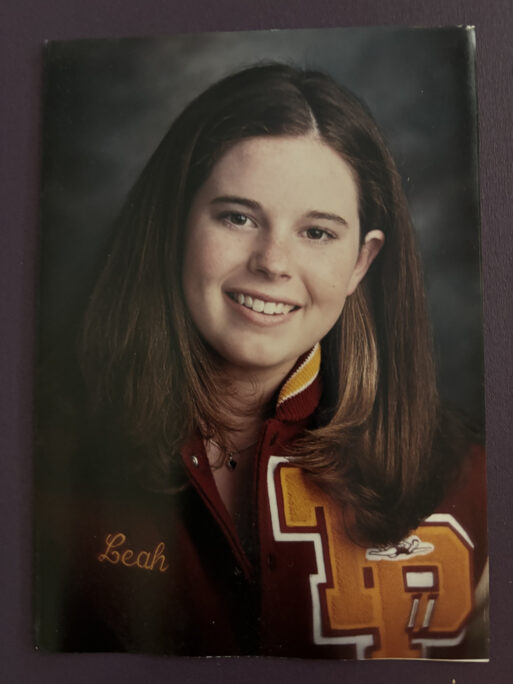 This is the story of Monica as told by Elizabeth. Our “Opening Our Hearts” stories are based on people’s real-life experiences. By sharing these experiences publicly, we hope to help our readers feel less alone in their grief and, ultimately, to aid them in their healing process. In this article, Monica tells the story of her older cousin, Leah, and how her death catapulted her into a world of existentialism and a journey to discover the meaning of life.
This is the story of Monica as told by Elizabeth. Our “Opening Our Hearts” stories are based on people’s real-life experiences. By sharing these experiences publicly, we hope to help our readers feel less alone in their grief and, ultimately, to aid them in their healing process. In this article, Monica tells the story of her older cousin, Leah, and how her death catapulted her into a world of existentialism and a journey to discover the meaning of life.
My cousin Leah was like the older sister I never had and the epitome of cool. Because she was 10 years older than me, I looked up to her a whole lot. She lived a life that fascinated me. When I’d walk into her room there were all these pictures of her at parties, living life, flipping off the camera.
“Cool,” I’d mutter to myself, imagining the exciting life she lived.
Leah was cool in her own way. She marched to the beat of her own drum. It was something I was always drawn to. She was never concerned about what others thought about her, something I thought must be so thrilling, so freeing.
Since I had no older siblings, I really felt grateful for Leah’s presence in my life. Like, here’s this older person who is teaching me things I don’t know.
As cool as she was, she was never too cool to hang out with her little cousin. She never seemed bothered to bring me along with her anywhere and always invited me places, which meant so much to my young self. Going to the pool was one of my favorite memories. She was an excellent swimmer, and we would have so much fun! Since I had no older siblings, I really felt grateful for Leah’s presence in my life. It was like, “Here’s this older person who is teaching me things I don’t know.” The sweetness and warmth that came from her felt like a hug, and I just loved being around it.
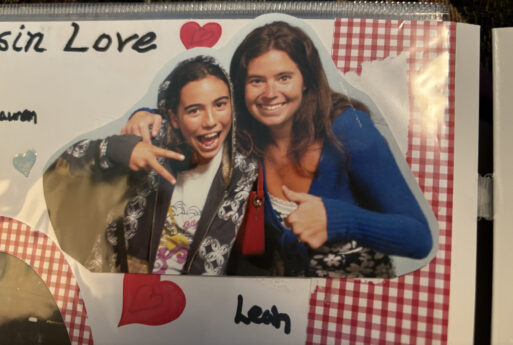
Leah and I had so much fun together, even though I was so much younger than she was.
She lived in San Diego, and I lived in Northern California, so a lot of my memories are of us going back and forth to spend time together. I vividly remember how she’d engage with me. It was unlike the way other older cousins and adults engaged with me; she would literally play with me and be silly with me. She had an openness that knew no bounds. One time when I was visiting, she took me to San Diego with her boyfriend, and I felt so cool to be included. She just had this way of making me feel like I belonged — that I was always welcomed. They treated me like I was part of the club, and I will never forget how good it made me feel. She acknowledged that I was younger but would always make it clear to me that she wanted to speak to me like I was my own person, not just her annoying little cousin.
Before I was really old enough to understand what was going on, Leah was diagnosed with eye cancer. I must have been about six or seven when they removed her eye. Despite her diagnosis, everything I remember about her through these times was normal. She lived a very healthy and normal high school life. It really seemed like she would be okay. She had a glass eye, but it was something I hardly even noticed at the time. It was more like, “Oh, cool! How does it work?” But since I was so young, I was always too shy to actually ask.
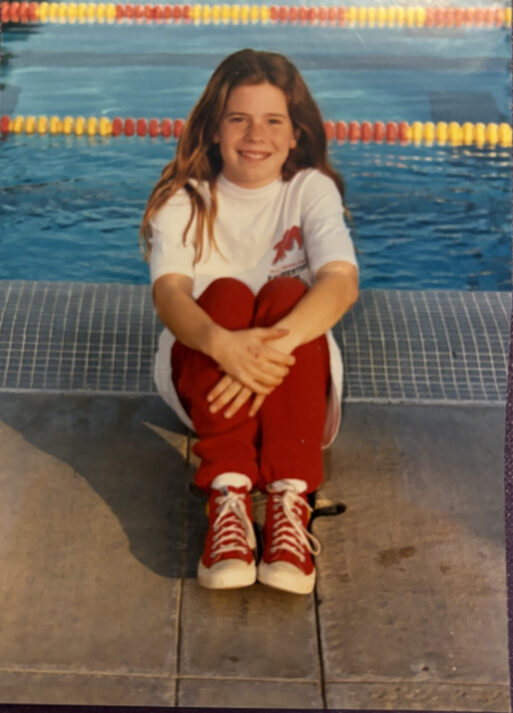
Leah was an excellent swimmer, and we spent many happy moments at the pool
Unfortunately, when she was in her late 20’s, Leah’s cancer came back, this time in her ovaries, and it spread quickly. I remember there being a very slight shift in my family around this time; quiet conversations happening behind closed doors that I was too young to be a part of. There was a lot more tiptoeing, and I was aware of something going on.
The last time I saw her she was very skinny and not very responsive. I wished I could have told her all the ways she impacted me, how much she meant to me. But seeing her in hospice in her home was very difficult for me. It was like she was a completely different person. Not so long ago she was so full of life and energy, and then all of a sudden she was depleted. It really happened that fast. The only thing that brought me comfort was seeing this glow about her, like she was at peace with everything. But I was kind of afraid to talk with her in this state. It was more like I just wanted her to know, “I’m here for you” rather than any full-blown conversations.
I wanted so badly to help everyone. How do I make my aunt and uncle feel better? How can I make Granny feel better? It was hard to feel so powerless in these moments. It was just this all-consuming feeling of, “I guess all we can do is wait,” and the fear around the idea of when is this going to happen? Everything felt like standing on the edge of a really high cliff.
This time the cancer was too much for her body, causing her to pass away when she was just 27 years old.
Most of the time when you lose someone and you’re still at a young age, it’s usually someone old. A grandparent in their 80’s or something. Someone who you know got to live a long and full life. But to have someone die who was only a little over 10 years older than you, it feels like a different kind of shock. A different kind of coldness that runs through your blood.
Her death hit me in a unique way because I identified with her so much. She was too young to die, and we had all these memories together and we should have still had so much life to live together.
This lack of relationship permanence hit me extra hard once Leah was gone, but it also taught me to value and appreciate these relationships on an even deeper level than I may have before.
I remember oftentimes thinking, “If this can happen to my cousin, this is going to happen to me.” It was a stark reminder that the people I look up to, these sort of maternal figures in my life, will never be permanent. This lack of relationship permanence hit me extra hard once Leah was gone, but it also taught me to value and appreciate these relationships on an even deeper level than I may have before. It was scary to think about opening myself up to being vulnerable when inevitably the other person would one day just be gone.
My aunt and uncle and other cousins spent a lot of time going to Hawaii after Leah’s death. So many of their family memories were rooted in Hawaii, and so it was healing for them to go and spend time there. Since Leah was such a strong swimmer they had decided to spread her ashes at sea.
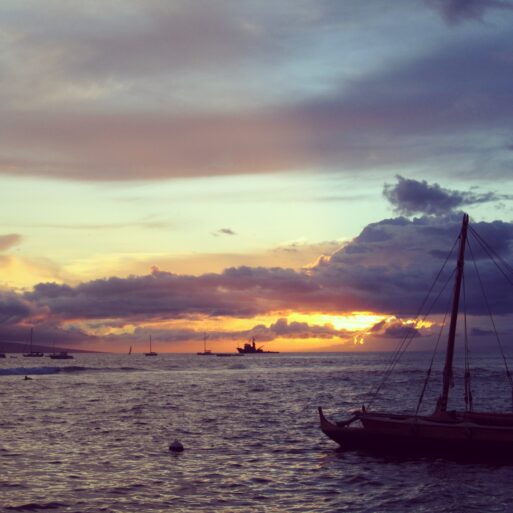
The site off Hawaii where we scattered Leah’s ashes
We all went together to scatter the ashes, and honestly it was a little weird for me. It was my first time in Hawaii, a place most people connect with vacations and good times, and there I was experiencing it from such a different perspective. We ended up going out on a boat, and while it is technically illegal to dump ashes into the water there, the person who took us out said,“Sure we can do it.” So, we went out on the water, and halfway there my granny threw up over the side of boat while we were all mourning and feeling very sad. There was a lot going on at once — a lot of chaos and a lot of emotions. Then a man on the boat started playing music for us.
Eventually we stopped at a reef and chose a spot to release her ashes. The water was so clear that we were able to see them go all the way till the end. My uncle kept saying, “I don’t want to let go, I don’t want to let go.” It was all very heavy for me to look at her parents, my aunt and uncle, and just think to myself how I cannot imagine what it feels like to raise a child and have to let them go like this, to say goodbye this early. But as complicated and complex as this moment was, it was also incredibly beautiful.
To this day if I see a rainbow or if we hear the song, we immediately think of her.
They played the song, “Somewhere Over the Rainbow” as we let go of the ashes, and as we were coming back to the shore a gorgeous rainbow appeared in the sky, and we all felt such a strong connection to it. Like it was placed in the sky just for us. To this day if we see a rainbow or if we hear the song, we immediately think of her. Seeing this beautiful rainbow in the sky felt like some sort of closure to this very difficult moment, like she was still here with us in some way.
I remember how difficult it was to process these emotions, to understand the full picture. It was jarring to speak to my granny, consoling her because she just had to bury a grandchild. It was all just so raw. Processing everyone’s perspective after such a tragedy was extremely difficult for me. I kept thinking, this isn’t normal. This isn’t how this should all be going.
We also lost another family member to cancer — my great aunt — the year before Leah died. My mom was her caregiver during this time, and as a result, I too spent a lot of time with her when she was suffering and sick. My great aunt was only in her 50’s, so the shock of her premature death and the shock of Leah’s premature death really rocked my family. I was only in 8th grade, trying to piece this all together, make some sense out of it. The juxtaposition of still trying to be a kid while also holding the weight of such heavy emotions and trauma made life confusing and changed the way I saw the world around me.
After experiencing the loss of my great aunt and Leah, and then a few years later the suicide of an uncle — it was more like something that lived inside of me. Something I became incredibly aware of.
My relationship to death before these experiences was very much indifferent, the way I imagine most kids’ relationship to something as abstract and unknown as death is. I knew death happened, and I knew it was a sensitive thing and was difficult, but without any real connection to it, it was outside of me. After experiencing the loss of my great aunt and Leah, and then a few years later the suicide of an uncle, it was more like something that lived inside of me. Something I became incredibly aware of. All of these deaths came to us unexpectedly and really made me begin paying more attention to things ending than I ever did before.
My first day of high school was probably a lot different than most of my peers. I walked into this new chapter of my life being wildly aware that I would be graduating and that it, too, would come to an end.
I was constantly reminding myself, “This is going to end soon.” I was acutely aware that death isn’t the only thing that represents an end to something, and I held this realization very close to me. Looking back on it now, I do believe having these thoughts and expectations was very helpful for me. It made me appreciate things a lot more than others might have.
While all my friends were living in the moment and experiencing rebellious stages that most teens go through, I was constantly thinking about mortality and life and beginnings and endings.
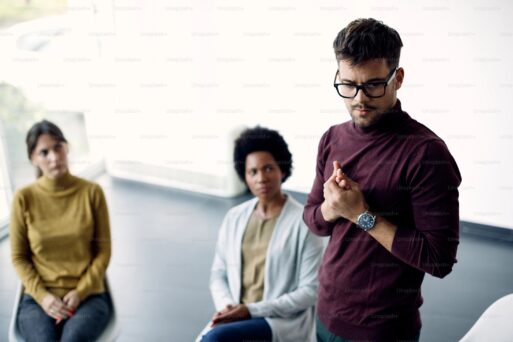
Bereavement support groups were one of the only things that helped me sort out my feelings after Leah’s death
Going through all this at such a young age also affected me in a negative way to the point where I became depressed. I would constantly obsess over what the meaning of life was if we all just die anyway, if everything just eventually ends. I was aware that these thoughts weren’t normal for my age, and it made me feel disconnected from my peers at times. I’m lucky that loved ones noticed the state of my mental health and I was able to get help.
The thing that helped me through such difficult times and emotions was going to bereavement groups. I learned pretty quickly that it was much harder for me to process these big emotions with my family. I found it easier to discuss my experiences in this group. Most people find it very hard to express themselves and their pain to their family members but find comfort sitting in a circle with a group of strangers. One of the most complex things was having to reconstitute my identity because I was no longer a person in relation to Leah, and it was like, well what does that mean now? As complicated as it was, it also left a lot of room for growth — a lot of space to ask myself questions about who I am and to really dig deep.
Little did I know then that this would eventually turn into my career path. I became so passionate about therapy and bereavement and helping others that I decided to pursue it myself. I eventually learned more ways to enjoy life rather than obsessing over the meaning of it. This came with a new sense of freedom and understanding; a shift I feel so grateful for. My goal now is, “how can I live out my own values in a way that is as fun and sustainable and kind as possible?” This is now my main interest.
For me, there is no better feeling than having someone confide in you; that just by being myself and letting the other person express freely, I can potentially help that person work through the same trauma and suffering I went through when I felt lost and alone.
This journey has been tough and I miss my cousin all the time, but I’m thankful that it has all led me to the path I’m on now. Everything about the direction I’m going in feels good and right.

 My Cousin’s Death Taught Me the Meaning of Life
My Cousin’s Death Taught Me the Meaning of Life


 How Dare You Die Now!
How Dare You Die Now!
 Debating Medical Aid in Dying
Debating Medical Aid in Dying















